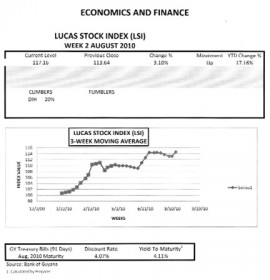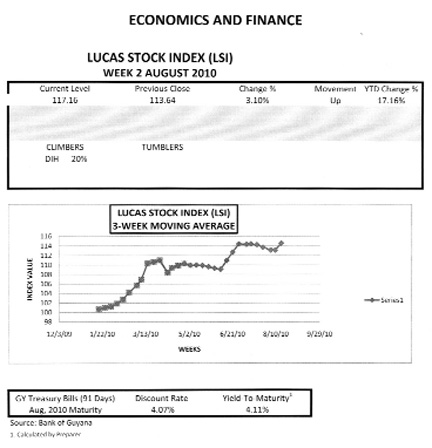By Rawle Lucas
Lofty Position
If developing countries are likened to children, China has now reached the age of adulthood. As many economists have predicted, China’s economy is now number two, knocking Japan down to third place and further behind the economy of the United States of America. China assumed the lofty position when its gross domestic product (GDP) reached US$1.33 trillion in the second quarter of this year, compared to Japan’s US$1.28 trillion. This level of economic output is twice that of most advanced western economies, including France and the United Kingdom. Even Germany, whose economic performance has been quite good, trails far behind China in the level of economic activity that the country generates. This most recent milestone is the culmination of China’s double-digit growth over the past ten years, fuelled by cheap labour and keen interest by foreign investors in its ever-increasing internal market. Guyanese should realize from these developments that China’s nascent economic influence in the country would grow as time passes.
Globalization
With the expansion of its economy, China’s influence across the globe has grown quietly, and probably provides the best evidence of how globalization works to the advantage of a country. It surpassed Japan a few years ago as the USA’s largest creditor. Every conceivable country, big and small, beats a path to China’s economic door. Economically stricken Greece is now relying on Chinese investments in its shipping industry, 20 percent of the world’s capacity, to escape its crisis. Another example of China’s strategic use of globalization is the elevation of Chinese economic interests in Africa that has come through expanded economic activity. While the rest of the word was not paying attention, Africans noticed that trade between China and their continent has reached an estimated US$100 billion, up from US$10 million two decades ago. While some experts see a slowing of Chinese economic interests in Africa, between 30 to 50 percent of China’s aid budget is devoted to Africa, a share that is proportionately higher than the combined percentage of the aid budgets of western donors.
Foreign Investment
Chinese economic interests beyond its shores, as many Guyanese would know, are not limited to arms-length trade relations and financial benevolence. Recent newspaper articles reveal Guyanese are beginning to feel the effects of growing competition from Chinese investors in Guyana. China also has an interest in owning and controlling production and distribution facilities in target markets, using its US$2 trillion of foreign reserves to acquire available assets. It has sunk its teeth in Guyana’s bauxite operations, a major economic contributor to the Guyana economy. Globalization offers China the chance to go wherever opportunity exists and China takes advantages of those opportunities. As a result, the stock of foreign direct investment owned by Chinese grew eight fold from US$27 billion in 2000 to US$230 billion in 2009 across all continents. Despite the growth in foreign direct investment, China still trails behind the major industrialized countries in ownership of foreign assets. Moreover, it remains a net recipient of foreign investment, taking in twice as much investment as it holds overseas.
Not Done Yet
However, China is not done yet. With an increasingly consumer-oriented population of over 1.3 billion people, China has a substantial domestic demand to meet. Globalization thus emerges as a critical long-term survival strategy for China, giving it access to much-needed raw materials and consumer markets for which it enjoys a comparative advantage in trade. Therefore, no one should expect China to sit on its laurels any time soon and to tone down its aggressive use of globalization as an economic strategy. It is reported that by year’s end, China would end up signing a series of investment deals with Brazil that totals nearly US$30 billion, in contrast to the US$83 million invested in Guyana’s southern neighbour last year. The industries include electric utilities, heavy industry and transportation, showing the diversity of interest in Chinese investments.
Polarization
Economic rank is one thing, but by reaching the number two spot on the global economic “Top 10 Chart”, China has elevated the contrast between state capitalism and laissez-faire capitalism. This could set off a new global polarization in a race for supremacy between the reigning superpower and its heir apparent. Due to a high GDP growth rate of 8.7% compared to the US’s rate of negative 2.4%, China’s total GDP can overtake the US’s as early as 2020. The prospect of laissez-faire capitalism losing ground to an economic system that places emphasis on state control rather than individual control is likely to trigger a new global debate as politicians and academicians intensify their comparisons of the two systems. It is not clear where such debates will lead in the future, but the juxtaposition of China’s rise to economic prominence close to the near collapse of the laissez-faire system opens another avenue for the discussion as politicians jockey for influence and power.
No Difference
As China marches up the economic great wall, it has several things going for it that bolsters its preference for state capitalism. It could point to the stimulus spending by countries to show that laissez-faire capitalism survived only because of massive state intervention. The management of its economic affairs includes holding trade surplus and high levels of foreign reserves. Moreover, China holds trillions of dollars in US treasuries within an economic system that the west defends, which gives it economic leverage over several issues, including exchange rate regimes. In addition, China controls a massive market to which western countries want continued access. Most of all, Chinese businesses are willing to operate under market conditions that permit the personal accumulation of capital. Under these conditions, state capitalism does not appear as a stark difference to laissez-faire capitalism. Without anyone to challenge China’s progress, it is free to pick and choose between state and laissez-faire capitalism to meet its economic interests. This unfettered progress means that pretty soon the inevitable will occur and China will become the number one economy. The march of China to the prime global position is a reality to which Guyana and the rest of the world should start getting accustomed.







